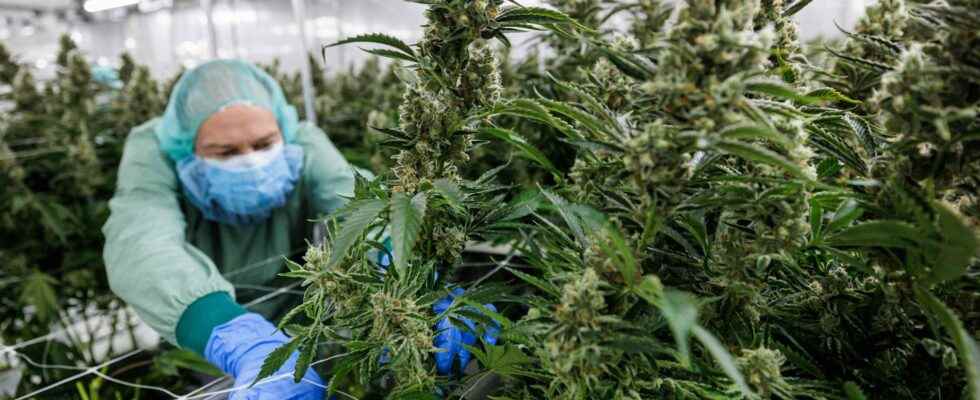Published: Just now
1 of 3 Photo: JENS SCHLUETER/AFP/TT
Next year, German adults can legally buy and smoke locally grown cannabis.
The complete reversal could set Europe in motion. Berlin’s legalization plans put the EU in a tailspin – and are predicted to create green ripples across the continent.
A green jungle spreads out under the light of yellow plant lights. The scent is overwhelming, sharp but sweet at the same time. Here, in the countryside just outside Dresden, Germany, an old slaughterhouse has been converted into Europe’s largest indoor cannabis cultivation. Thousands of copies of the controversial plants grow on an area the size of twenty football pitches.
Today, the company Demecan annually produces around one ton of cannabis for medical use, which has been legal in Germany since 2017. But if the German government’s plan goes ahead – to legalize cannabis for private use as early as next year – production could quickly increase tenfold, according to CEO Philipp Goebel.
– We have the opportunity to expand the facility to grow cannabis for our own use, he tells the AFP news agency.
Template for all of Europe?
Germany, Europe’s largest economy, launched its bold plans in October 2022. Health Minister Karl Lauterbach (SPD) then announced plans for what he called “the most liberal legalization of cannabis in Europe” and “the most regulated market” within the EU.
– This approach can become a template for the whole of Europe, he said according to Deutsche Welle (DW).
Unlike the cannabis-liberal Netherlands and Portugal, where private use is to some extent decriminalized, Germany, as the first EU country, wants to legalize the entire production chain – from cultivation and processing to trade and sale. According to the draft bill presented in October, German adults will be allowed to possess between 20 and 30 grams of cannabis for personal use. Consumers should be able to buy hashish and marijuana through a network of licensed shops and pharmacies, much like a Systembolaget for cannabis. The goal is to fight the black drug market, to be able to control supply and quality, and to get away from the unsustainability of criminalizing millions of consumers.
Will the EU intervene?
Today, however, cultivation of cannabis is illegal within the EU. In other words, the Union’s cross-border laws, on everything from the internal market to drug smuggling, threaten to put a damper on the German party – unless the government in Berlin can persuade the EU to get on the green train.
The fact that Germany wants to ensure that the legalization complies with EU legislation means that Brussels is forced to take a position on a sensitive issue. Right now, the EU Commission is carrying out an initial review of the German proposal. A no from the commission means, according to the social democratic German health minister, that the country’s plans go up in smoke. A yes vote, on the other hand, is predicted to lead to the EU paving the way for a legalization wave across the entire Union, writes Politico.
If the European Commission gives the green light to Germany’s plans, other European countries are believed to follow suit. For example, Finland’s Greens, one of five parties in Prime Minister Sanna Marin’s government that has long advocated the decriminalization of cannabis, says it is closely following developments in Germany. In the Czech Republic, there are already plans for a regulated market for private cannabis use, according to AFP, and in Denmark, the Folketing last year called on the government to launch a five-year pilot project for legalization.
Billion state business
In 2022, both Malta and Luxembourg also legalized cannabis for personal use.
– Think of it as falling dominoes, Lewis Koski of Metrc, an American company that monitors safety in the cannabis industry, told Politico.
Making the “green gold” legal also means good business for the government in Berlin. Legalization is estimated to strengthen the German treasury by 4.7 billion euros per year – the equivalent of more than 50 billion Swedish kronor, according to a recent study from the Heinrich Heine University in Düsseldorf.
Facts
Cannabis
Chancellor Olaf Scholz’s government – the so-called German “traffic light coalition” consisting of the social democratic SPD, the liberal FDP and the environmentalist party The Greens – is behind the effort to legalize the sale of cannabis to adults in licensed shops. According to the plan, the effects of any legalization are to be evaluated after four years.
Cannabis, variously called hashish or marijuana, is a plant-based drug that is used both for medicinal purposes and for intoxication. According to an EU study conducted in 2022, 22 million European adults used cannabis in 2021.
Using cannabis for intoxicating purposes is prohibited in Sweden and most of the world. However, there are exceptions in a number of countries and states in the USA, for example. In some cases smaller amounts are tolerated, in others the practice may be approved in certain specific locations.
Very few countries allow both cultivation, distribution and consumption of cannabis for intoxication. In June 2022, for example, Thailand legalized the cultivation and possession of cannabis.
For medical purposes, the picture is different, with at least 50 countries approving it in some form. Even in Sweden, certain specific cannabis-based preparations are allowed for patients with specific conditions.
Sources: Reuters, UN, Deutsche Welle, European Monitoring Center for Drugs and Drug Addiction (EMCDDA)
Read more
